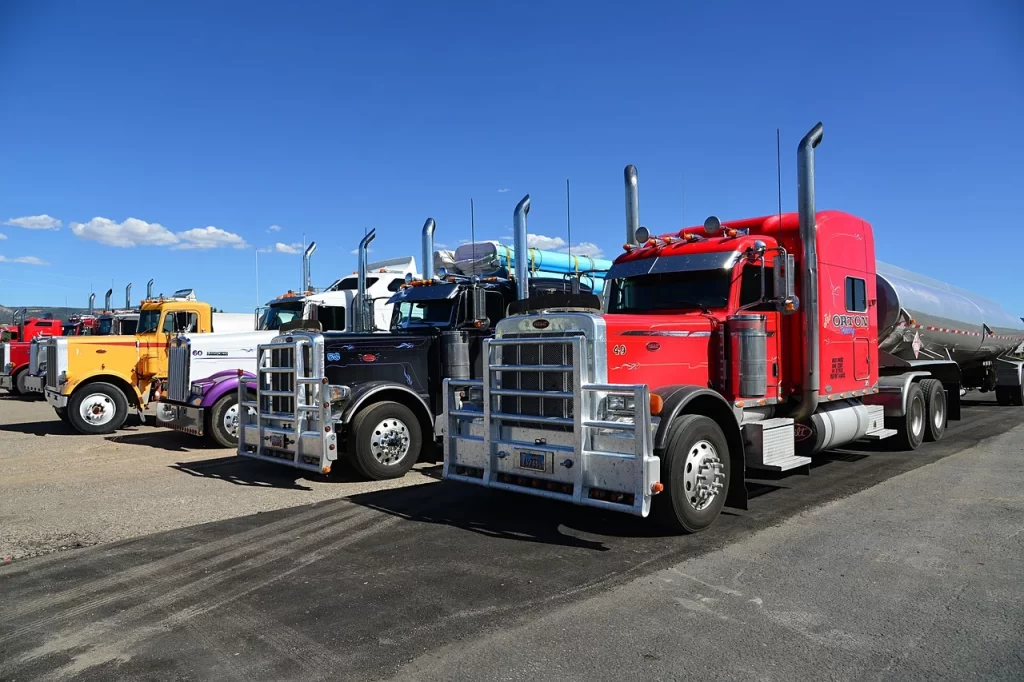
As a property member, the parking lot is the heart of your business. With a steady stream of truckers supplied through our popular truck parking app, there aren’t too many things that can cause disruption to your monthly revenues, especially with the current truck parking crisis driving demand.
However, even the most successful truck parking business can be vulnerable to the unpredictable nature of weather if unprepared. From extreme heat to torrential downpours, harsh weather can potentially inflict damage on your asphalt investment, leading to unexpected costs and disruptions to your business.
Again, this applies only to the unprepared. Being aware of a few things and knowing how to respond can completely negate unexpected costs and disruptions.
This short blog post will show you how. But first, how can bad weather affect your truck parking lot business? Let’s take a quick look before moving on to a few strategies.
How Weather Can Cost You
The financial impact of weather-related damage on a truck parking lot is often underestimated and commonly overlooked. Just one solitary season of neglect can result in a nasty domino effect of costly problems, the most common of which is intense summer heat that can cause asphalt to soften and deform.
This can lead to rutting and undulated depressions that harm your lot’s appearance and functionality. Heavy rainfall can erode unsealed surfaces, creating potholes and cracks that pose risks to trucks and drivers, and it can happen really quickly.
To make matters worse, winter’s freeze-thaw cycles can compound these issues, causing further deterioration and expanding existing damage.
The problem is that repairing this damage is not only horribly inconvenient but also surprisingly expensive. Beyond the cost of patching potholes and resurfacing, you could even face additional expenses like:
- Loss of Revenue: A damaged lot may need to be closed for repairs, resulting in lost income from parking fees.
- Liability Issues: If a truck driver or pedestrian is injured due to poor lot conditions, you could be held liable for damages.
- Decreased Property Value: A poorly maintained parking lot reflects negatively on your property’s overall value, damaging your brand with bad reviews.
The best approach is to be mindful of the problem and acknowledge the potential threat of it transpiring. Be diligent and keep a close eye on the surface, investing in basic upkeep and addressing weather-related issues quickly.
The key message here is to respond to issues early before they grow into something costly. To do so, you need to be aware of how the different seasons can pose separate issues.
Seasonal Maintenance Checklist
Again, taking a proactive approach to truck parking lot maintenance is your best defense against costly weather-related damage. With that in mind, we have prepared a seasonal truck parking checklist to help you stay ahead of the issue:
Spring
As the snow melts and April showers arrive, your focus should be on drainage, so clear out any debris that has accumulated in drains and gutters over the winter months. You might be surprised how much they build up if neglected. This will be a huge help in preventing water from pooling on the surface, which can weaken the asphalt and lead to potholes.
Now is also an ideal time to handle any potholes and cracks that developed during the winter freeze-thaw cycles. Patching them quickly prevents further damage and keeps your lot safe from truck traffic. If your seal coating is looking a bit worn, consider a touch-up to protect against the upcoming summer sun.
Summer
The scorching summer sun is no friend to asphalt. The intense heat can soften the surface surprisingly quickly and lead to rutting, especially under the weight of heavy trucks. Again, regularly inspect your lot for signs of deformation and address any issues immediately.
As the mercury rises, cracks can expand, so it’s important to seal them before they become worse. Don’t forget about dust control, though – a dusty lot can be a nuisance to drivers and neighbors in equal measure. Dust suppressants are inexpensive and can really help keep things under control.

Fall
As the leaves start to fall, so does your parking lot revenue if you’re not prepared. Clearing drains of leaves and debris should be a priority to prevent clogging and ensure proper drainage during fall rains.
This is also the time to start thinking about winter, so go ahead and stock up on de-icing materials and ensure your snow removal equipment is in good working order. Just a little preparation in the fall can save you relentless headaches come winter.
Winter
Winter brings the most obvious weather issue in the form of snow and ice, depending on where your parking lot business is located, of course. If you are based in a frequently icy climate such as Alaska, you will already be well prepared for winter weather. If you are not, regular snow removal is a habit you need to become familiar with in areas with cold winters.
Battling ice is simple enough – just choose a de-icing agent that won’t damage your asphalt and apply it according to manufacturer instructions. Also, be mindful of where snow is piled: excessive weight in one area can lead to structural issues. As a side note, keep plenty of salt or grit on hand for icy conditions.
Additional Weather Considerations
Wind: A stiff breeze might seem harmless, but it can turn your lot into a collection zone for debris like tree branches and litter. Not only does this look unprofessional, but it can also create hazards for trucks and drivers. Regular clean-up is required, and if you’re in an especially windy area, consider investing in a few windbreaks or barriers.
Lightning: If your truck parking lot has lighting or other electrical systems, you need to protect them from lightning strikes. While rare, a direct hit can cause serious damage, leaving you in the dark and potentially liable for any resulting accidents.
Flooding: A heavy downpour can quickly overwhelm a poorly designed drainage system, leaving your truck parking business underwater and pretty much unusable. Get into the habit of inspecting and maintaining your drainage systems to ensure they are free of debris and functioning properly.
If your lot is in a flood-prone area, you might wish to consider additional measures like raised curbs or even permeable paving.
Regional Variations: Weather patterns vary significantly from region to region. Some areas experience extreme heat and drought, while others face heavy snowfall and freezing temperatures.
Either way, you should create a maintenance plan that reflects your specific climate. Think about essential elements like temperature range, precipitation levels, and the likelihood of severe weather events like hurricanes or blizzards in your area.
Bottom Line
Ultimately, defending a truck parking lot against harsh weather conditions boils down to good common sense. Provided you get into the habit of regular checks, protecting your business against the extremities shouldn’t pose too much of an issue.
Interested in becoming a property member with Truck Parking Club? If you have private land available, there has never been a better time to take advantage of the shortage in truck parking across America.
Sign up with Truck Parking Club today and learn how we can help you turn your land into a healthy, reliable income stream, no matter what the forecast holds!
The information published herein is for general informational purposes only. Truck Parking Club does not make any representations or warranties about the completeness, reliability, legality, and accuracy of this information. Any reliance placed on such material is strictly at the user’s own risk. Truck Parking Club shall not be responsible for any losses or damages incurred in connection with the information published herein.





